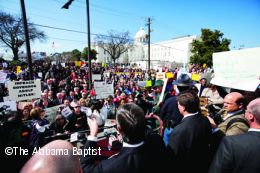By Sondra Washington
Are the tactics being used to convince Alabamians to legalize and expand gambling a grass-roots movement of the people, as some have claimed, or a scheme of a few hoping to score big in business? Gambling opponents say a deeper look into the rallies, marches, commercials, concerts and big-name guest speakers pushing the gambling cause across the state may reveal efforts steered by a handful of moneymakers and politicians — not the community at large.
Last year, an Enterprise-based group called the Sweet Home Alabama Coalition began running commercials calling for taxation on slot machine-style gambling being called electronic bingo. Later it was discovered that casino developer Ronnie Gilley was behind the group, which was founded to promote gambling bills legalizing and expanding the activity at Houston County’s Country Crossing development and other venues across the state.
“I wouldn’t doubt if they spent several million dollars on ads,” said Birmingham attorney Eric Johnston, who also directs Citizens for a Better Alabama (CBA). “I think the goal, by the gamblers running those ads, was to deceive the public and make them think it was grass-roots efforts. … Their ads were meant to get support for the bills that they wanted. The whole purpose of the bill was to legalize and monopolize the bingo gambling that’s already going on in the state. … What they (gambling bosses) were trying to do is save their bacon. … They knew they were going to lose.”
After several years of fighting gambling on the state level, Johnston founded CBA, which ran advertisements to show the state’s residents the negatives surrounding gambling and the legislation drafted to expand it.
“We were just running ads because the bills were bad,” Johnston said. “Our supporters had no stake in it at all. They were just good Christian businessmen, and [CBA] was not (funded by) any Indian gambling money. [Gambling bosses] were trying to create a monopoly that was not subject to the law of this state and that exempted them from the Alabama criminal code, the statutes of the state, the Alabama Constitution and the decisions of the Alabama Supreme Court.”
During the past few legislative sessions, pro-gambling forces were also said to be the culprit behind the large number of Alabama citizens brought to the Statehouse on charter buses to support gambling expansion bills at public hearings. Most of the citizens came from Houston, Greene or Macon counties, the homes of Country Crossing near Dothan; Greenetrack in Eutaw; and VictoryLand in Shorter.
But when Alabama Citizens Action Program (ALCAP) and CBA tried to hold an anti-gambling rally on the Statehouse steps Feb. 23, several busloads of pro-gambling Alabamians arrived and out-yelled ALCAP and CBA’s speakers, including Gov. Bob Riley and first lady Patsy Riley, as they attempted to address the crowd.
“It was obvious that they had been instructed to shout down all our speakers because nobody acts that way,” said Joe Godfrey, executive director of ALCAP. And the signs used by pro-gambling attendees appeared to be professionally printed while the signs used by people supporting ALCAP and CBA were homemade, he added.
“Who produced the signs?” Godfrey asked. “We could not afford buses. Our people got off from work and drove their personal vehicles great distances. There were some church vans, but for the most part, it was individuals who drove themselves and carpooled to get there. … I did hear people say they were employees of casinos and had been laid off, and I would assume they were paid by the casino owners to be there.”
Johnston also believes the gambling forces are “orchestrating” the rallies.
“It s not people from all parts of the state (participating) — just people from Macon, Greene and Houston counties,” he said. “A grass-roots effort means that it comes from the people … who have a concern. It’s not orchestrated by the people who have a special interest.”
Jefferson County District Attorney Brandon Falls said, “I believe [the people at the rallies] were led by gambling interests or those who stood to benefit from gambling whether they are owners of the operations or the attorneys representing them.
“A grass-roots movement in a down economy is not going to be able to put together the type of funding required to launch that type of a campaign,” he said.
During the anniversary of Bloody Sunday in March, pro-gambling forces held marches and rallies to promote gambling — two of which were said to be for the sake of protecting jobs and voting rights and led by two nationally renown civil rights activists, Jesse Jackson and Al Sharpton.
According to The Birmingham News, the “pro-bingo campaign” was reportedly “organized by former Tuskegee Mayor Johnny Ford (who, afterward, lost his race for the Alabama Senate) and Montgomery businessman Greg Calhoun.”
Jackson spoke to crowds gathered in front of Fairfield City Hall and on the steps of the Alabama Capitol. He also led a march in Montgomery.
According to The News, Jackson said, “We demand jobs and justice and voting rights.”
The newspaper also reported that “marchers included employees from VictoryLand and Country Crossing.”
According to the All American Talent and Celebrity Network, Jackson’s booking fee is more than $50,000. Neither Jackson nor Sharpton’s offices responded to interview requests.






Share with others: